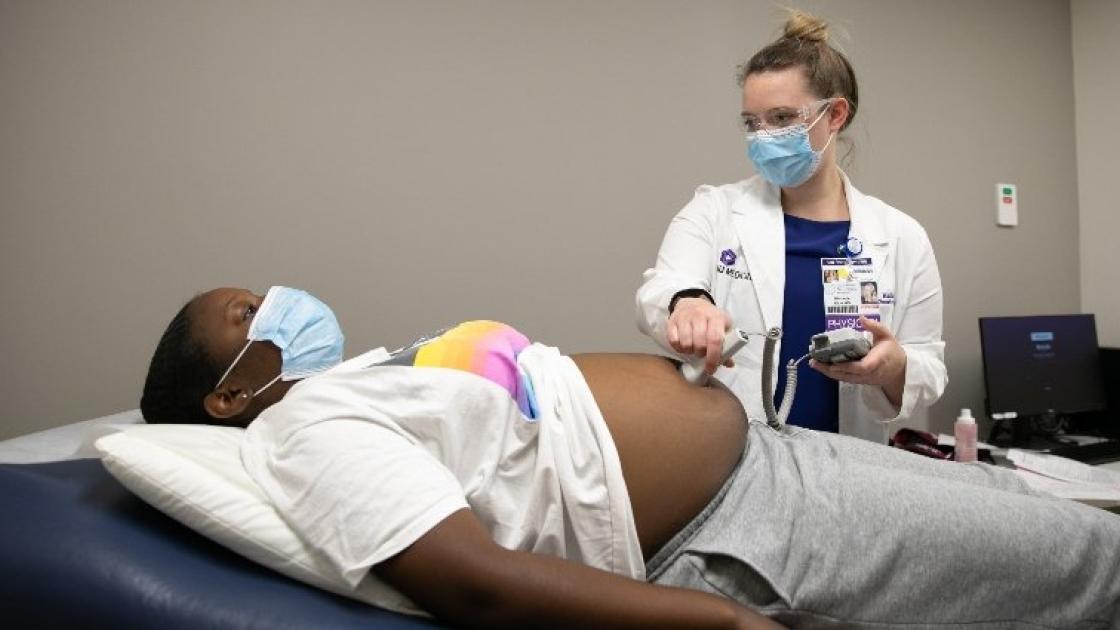
FAQs about pregnancy, breastfeeding & the COVID-19 vaccine
The COVID-19 vaccine rollout is underway across the United States and around the world. Gaps in information to the public are common. In light of this, many individuals have some questions about whether a vaccination is appropriate.
If you're an individual who is pregnant, nursing, or trying to conceive, our team at SIU Medicine honors your desire to make the most well informed decision for yourself, your family, and your community. We also are committed to providing excellence in care based on the best-available evidence at every opportunity. That's why we stand with professional organizations like the American College of Obstetrics and Gynecologists who encourage pregnant and nursing individuals who meet eligibility requirements to receive the COVID-19 vaccine, while also recognizing that each individual has the right to informed consent and medical autonomy.
Current research indicates that the safety and effectiveness of the vaccine is expected to be similar for both pregnant and non-pregnant individuals. There's no safety information specific to the COVID-19 vaccine in pregnant or breastfeeding individuals because these people were excluded from clinical trials, so the potential risks to pregnant individuals and fetuses are unknown. That said, current evidence indicates that theoretical concerns about vaccine safety do not outweigh the likely benefits of getting vaccinated.
SIU Medicine encourages you to ask the questions you need to help you make this important decision for yourself and your family. Keep reading for six of the most commonly asked questions we've been discussing with our patients about pregnancy and the COVID-19 vaccine.
6 FAQs about COVID-19 vaccine and pregnancy
1. My partner and I are trying to conceive. Should I skip the COVID-19 vaccine in case I get pregnant?
It is recommended that individuals who are trying get pregnant receive the COVID-19 vaccine, assuming they meet the CDC criteria for vaccinations and do not have any known contraindications, such as severe allergy to any ingredients in the COVID-19 vaccine. Because of the way mRNA vaccines for COVID-19 work, they are not thought to increase the risk of infertility, and it isn't necessary to put off trying to conceive after completing both doses of the COVID-19 vaccine.
2. I just discovered I’m pregnant. Should I get vaccinated?
Yes. And if you become pregnant after receiving the first dose of the COVID-19 vaccine series, it's recommended that you get the second dose as indicated. Individuals who become pregnant within 30 days after getting the COVID-19 vaccine are encouraged to participate in the CDC's V-SAFE program to provide additional support and access.
3. Should I talk with my doctor before getting vaccinated?
While not required, it's appropriate to talk to your primary care doctor or OB-GYN prior to getting vaccinated. Conversations between a patient and their provider can be beneficial for evaluating and discussing individual risks, including whether an individual is having a high-risk pregnancy. These conversations can also serve as an opportunity to take into account the individual's values and medical autonomy.
4. Is one type COVID-19 vaccine safer for me than another if I am pregnant, nursing, or trying to conceive?
Right now, there is no preference for the use of one COVID-19 vaccine over another for pregnant or nursing individuals.
5. If I'm breastfeeding, should I still get the COVID-19 vaccine?
It is recommended that lactating or breastfeeding individuals get vaccinated, assuming they meet the CDC criteria for vaccinations and do not have any known contraindications.
6. What are the risks for my unborn baby if I choose to get the COVID-19 vaccine?
Currently, COVID-19 vaccines have not been tested in pregnant women, so there's no specific safety data about their potential risks for pregnant women and unborn babies. COVID-19 vaccines are mRNA vaccines, which do not contain any live virus nor use an adjuvant to enhance effectiveness. These vaccines also don't enter cell nuclei and do not alter human DNA, and therefore are unable to cause any genetic changes.
The COVID-19 vaccine development and approval is an ongoing and actively evolving process. Our team at SIU Medicine is committed to providing our community with the most up-to-date information available. Call 217-545-8000 to connect with an experienced provider near you.




